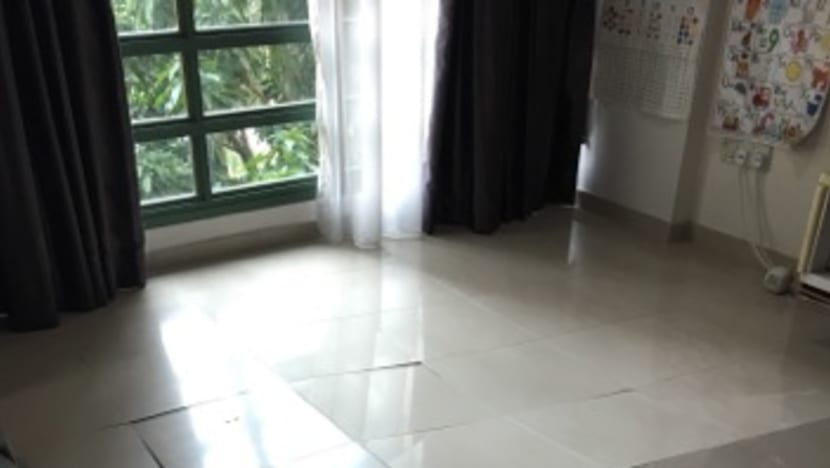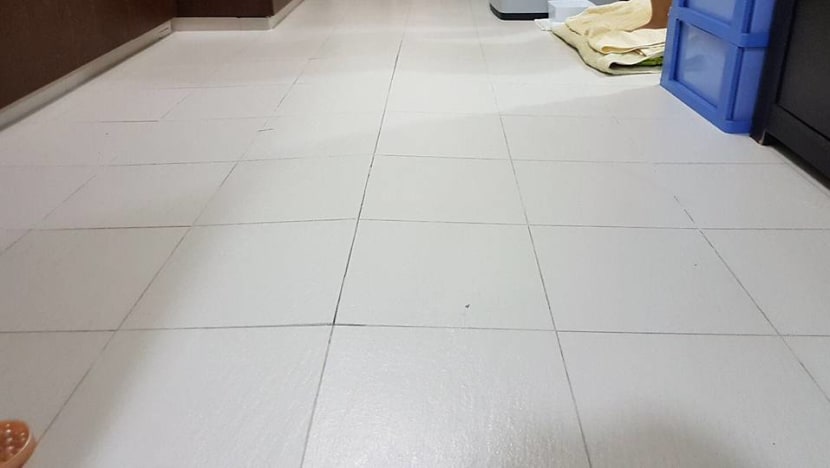What causes floor tiles to suddenly pop
Chilly weather, poor workmanship, wear and tear could have contributed to 'explosions', say experts

The floor tiles cracked just after midnight on Monday at this HDB flat in Admiralty. (Photo: Frederick Goh)
SINGAPORE: The chilly weather could be behind the popping floor tiles phenomenon seen at Housing and Development Board (HDB) flats in several locations over the weekend, experts told Channel NewsAsia on Monday (Jan 15).
Vice-President of the Singapore Renovation Contractors and Material Suppliers Association (RCMA) Dean Lim said that the incidents could have been triggered by the recent cooler-than-usual weather.
The humidity is also a contributing factor.
"The moisture may be trapped underneath the tiles and if there is any sudden change in temperature, for example, if the flat below has its ceiling light turned on for long hours, generating heat, it could cause the cement to lose its bonding capability," he said.
The cooler weather may also cause more dramatic expansions and contractions than usual, and if the gap between tiles is not sufficient, this could lead to tiles popping, he added.
Interior design firm Aristo Group's managing director Alvin Wong agreed that the weather may have a part to play in the recent spate of incidents. "When the temperature drops too fast, it may cause cracks," he said.
POOR WORKMANSHIP, WEAR AND TEAR COULD HAVE PART TO PLAY
But notwithstanding the weather, poor workmanship also adds to the problem, said the Associate Chair (Research) at Nanyang Technological University’s School of Civil and Environmental Engineering, Associate Professor Zhao Zhiye.
He said cold weather and rain will "accelerate the expansion or contraction" of the adhesives used in floor tiles, but poor workmanship contributes significantly to popping incidents.
“Proper bonding between the tile and adhesive material behind the tile may reduce the thermal expansion and stress concentration,” he said.

Contractor Tommy Chang, who has been in the business for 20 years, said that popping can also be caused by poorly made cement screed.
Mixing sand, cement and water in the wrong proportion could lead to air pockets underneath tiles that could eventually pop, he said. Since June 2015, it has been compulsory for tilers to use pre-packed cement, which is pre-mixed to the right proportion but costs more than raw cement and sand.
Mr Wong said that natural wear and tear, as the moisture in cement screed evaporates over the year, can also lead to tiles cracking and popping.
Last year, in response to questions in Parliament on popping and cracking tiles, the Ministry of National Development (MND) said that HDB received about 2,000 cases of dislodged floor tiles a year.
"This works out to a nationwide yearly average of about two cases per 1,000 dwelling units," MND had said.
It also said that tiles, like all fittings, fixtures and finishes in a flat, are subject to wear and tear over time, and may dislodge due to various reasons, such as differential thermal expansion and contraction of tiles, or the natural deterioration of the bond between the tiles and the screed surface.
"Flat owners are responsible for the maintenance of their flats, including repairs for general wear and tear," MND said, adding that HDB offers "goodwill repairs" for dislodged tiles for up to 15 years.
HDB said on its Facebook page on Monday that it is aware that "some flat owners have encountered dislodged tiles in their homes recently".
"If there are dislodged tiles in your flat, you should carefully move the dislodged tiles to a safe area, and cover the affected spot with cardboard for safety," HDB said, adding that residents who need advice on repair work may call its branch hotline between 8am and 5pm.














